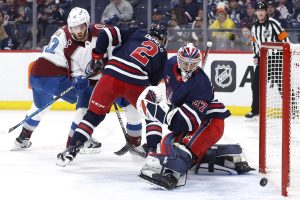This could be an endless list, after the… well, everything. The 2020-21 NHL season is going to be utterly unique in the league’s 103-year history. For the sake of this article, we’re limiting ourselves to three questions: one about players, one about the teams, and one about the league.
Biggest Questions for the 2020-21 NHL Season
Will Taylor Hall lead the Buffalo Sabres to the Playoffs?
When Taylor Hall signed with the perennial basement-dwelling Buffalo Sabres, reactions were often cynical. After hearing him say that “winning” and “stability” were his primary motivators, seeing him take a one-year deal with the Sabres encouraged it. It had, after all, been nine years since Buffalo made the playoffs. As for stability, Ralph Kruger is their sixth coach in that same time frame. So from that perspective, it’s easy to look at his $8 million, one-year deal as a cash grab on his part. For the Sabres, it was seen as a desperate move to keep their star player happy. But there are sound reasons to take this deal – for both sides.
The Signing Works
Obviously, the Sabres want to win. A successful team is a much more profitable one – especially a suddenly successful team. Getting into the playoffs and not just the race would be a considerable boon that could last a couple of seasons, even if Hall leaves immediately after his contract expires. While the team is reasonably set at forward, they are ready to rebuild both defence and goaltending next year. And the best free agents are going to look at the team’s success in their signing decisions. They want to win as much as any fan, and a playoff team anchored by Rasmus Dahlin and Jack Eichel is tempting.
For Hall’s part, the money is going to be part of the decision. For fans expecting him to sign on with a Stanley Cup favourite, well, they usually have their forward lines pretty set. And dang few have an extra $8 million – or even $6 million – for one player lying around. If they do, they usually aren’t favourites. But the one-year deal fits with the free-agent mentality this year. Less money is around, or a player had a weak year, so they’re playing for the next deal. However, with the extended flat cap coming for years – something else he didn’t know when the deal was signed – getting a better deal can be tough. Even so, there is a bonus for Hall to sign specifically with a weaker team.
Best Laid Plans
Hall is fighting a reputation of not being able to be The Man for a team, fairly or not. That he’s made the playoffs twice in ten years isn’t helping. He was supposed to be the piece that brought the New Jersey Devils up to contender status. The Arizona Coyotes didn’t surge when he joined them for half of the 2019-20 season. The 29-year old Hall is trying one more time, and this is possibly the most rewarding. If he can get the Buffalo Sabres into the playoffs and perform well there, it would go far towards shaking his reputation for being “good, but not a winner.”
The biggest source of optimism for the team might be the weirdest: their October starts. Last year, the team went 9-2-2 to start the season. The year before they had a 6-4-2 month. Each time they eventually slipped out of a playoff spot by year’s end – that’s tougher to do when the year’s 26 games shorter! There is a huge factor working against them this season, and yet another Hall couldn’t have foreseen when he signed his deal back in October…
How Do New Divisions Affect the Standings?
Teams are changing where they play and who against, in case you haven’t heard. As awkward as the new divisions look, there are benefits to be had. Travel is radically changed, of course, which mostly benefits the Central and East division teams. Just as well with the condensed schedule. Unfortunately, this does hurt the West and North teams, relatively speaking. Even so, fans should be mollified by the ‘MLB series’ style of road trips.
Familiarity Breeds Contempt
Speaking of which.
If you think back-to-backs are fun, wait until they’re in the same building! Teams are being forced into it as a cost-cutting measure, but this is one feature that might stick around. Any bad blood that occurs in a game might be forgotten in a month with a dozen more games between it and a rematch. No chance for a cooling-off period in 24 hours, though. But that’s not even the most interesting part of a multiple-day series: that it’s a series is. Coaches, as much as teams, are going head-to-head. What players come in from the Taxi Squad if your team gets blown out in game one? Will the Cabbies add muscle or skill? Which games do the starters dress for compared to the backup? Does the coach bring in a defensive specialist, or faster, younger legs, or what?
Did it Have to be Snakes?
Some teams are seeing their playoff chances directly hurt by this one-year realignment. The three Western Canadian teams, for instance, have to be annoyed at replacing California and Arizona with Ontario and Quebec. On the other hand, they are the only division where the majority of teams will reach the playoffs. The aforementioned Buffalo Sabres, on the other hand, are hosed. While the Montreal Canadiens and Toronto Maple Leafs are the class of the North, they are just good teams, not invincible ones. The Sabres no longer have those two plus the Ottawa Senators, Detroit Red Wings, and Florida Panthers to win points against. Now they’re pushed into a division where the “weakest” team is pretty much them or the New Jersey Devils. And they have to beat four teams to make the playoffs, investing big in Taylor Hall to do so.
Will They Finish the 2020-21 NHL Season?
Yes. Hopefully.
Simply put, there is an awful lot at stake for the teams, owners, and the NHL this season. Even though several teams suggested that they should close for the year, history shows how long it takes to recover from such an extended break. The only reason the 2012-13 lockout ended was that owners and players remembered what happened after the 2004-05 lockout cost the entire season. It hurt. And even then, the NBA regained whatever claim the NHL could make on being the third most popular professional sport in the US and never returned it. No, really: at one point, that was a possibility.
This season, of course, the wound isn’t self-inflicted, but the league is in triage anyway. The mix of cash-saving moves and public health requirements means a strange and truncated season without live fans. Even so, the season must continue to fulfil contracts – like the playoffs were – and to prevent lawsuits. Sponsors purchase naming rights so they get spoken on camera and radio, after all. If teams aren’t there, what is the obligation to honour the deal? It gets real messy, real quick.
Priorities, Folks
But health standards take precedence. Satisfying dozens of jurisdictions has loaned itself to heavy restrictions on player movement. It’s quite possible that if the NHL hadn’t succeeded as well as it did for the 2020 Stanley Cup playoffs there wouldn’t be a season this year. But that was fewer teams, one location, and no travel at all. This time out, the risk is exponentially higher for contamination, while the precautions are fewer. Some players are very likely going to test positive as the season progresses. To counter that, quarantine protocols have been finalized and permissions granted from local health officers. Players and teams recognize that they are going to have to improvise a lot this year.
Bigger rosters, taxi squads, limited travel, shorter season… There’s no way the league is letting that much work go to waste.
Y’all ready for the 2020-21 NHL season? ‘Cause, it’s gonna get weird.
Main Photo:
Embed from Getty Images






